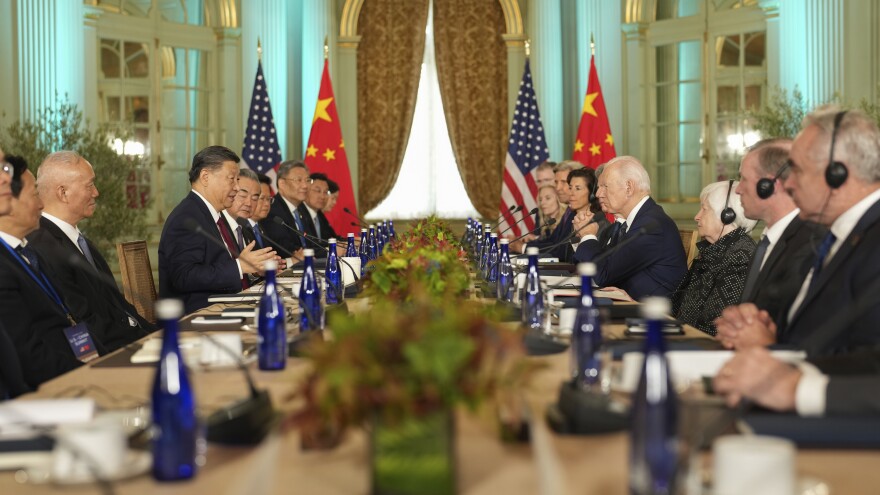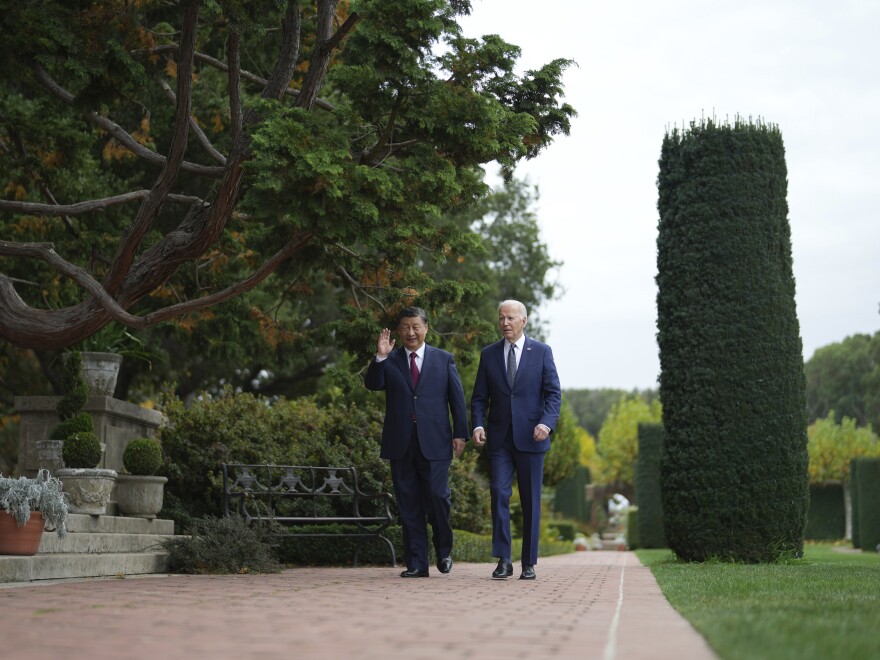Updated November 15, 2023 at 8:56 PM ET
President Biden announced agreements he made with Chinese leader Xi Jinping on open military communication channels and counternarcotics at a solo press conference Wednesday, after speaking with the Chinese leader for the first time in a year.
The two leaders met for about four hours in California just ahead of the Asia Pacific Economic Cooperation summit taking place in San Francisco. Their talks come as tensions between the world's two largest economies have been on the rise, and as the White House has been trying to take a strong-on-China approach.
The last time Biden and Xi spoke face to face was at the G20 summit in Indonesia in November 2022.
"Our meetings have always been candid and straightforward. We haven't always agreed, but they've been straightforward," Biden said on his meeting today with Xi.
At the press conference, Biden announced that he and Xi reached an understanding about reducing the flow of fentanyl from China to the U.S.
"We're taking action to significantly reduce the flow of precursor chemicals and pill presses from China to the Western hemisphere," Biden said. "It's going to save lives and I appreciate President Xi's commitment on this issue."
Biden also announced the countries would resume military to military contact.
In August 2022, Beijing declared it was cutting off dialogue with the U.S. on major issues such as climate and military relations after then Speaker of the House Nancy Pelosi's visit to Taiwan.
"We're back to direct, open, clear, direct communications on a direct basis," Biden said.
Biden added the two spoke about getting their experts on artificial intelligence together as well to discuss risks and safety issues associated with the technology. He said the world expects the U.S. and China to compete with each other without veering into conflict, and to work together when possible.

Over the course of their meeting, Biden and Xi discussed Russia's war in Ukraine, conflict in the Middle East, China's moves in the South China Sea and security in Taiwan.
Biden made it clear that he and Xi didn't agree on everything. He said he specifically provided names of people the U.S. thinks China is holding hostage but said there was "no agreement" on getting them released. He told Xi he expects no interferenc from China in Taiwan's upcoming election. And he was critical of China's activity in the South China Sea.
But Biden emphasized that the open line of communication reestablished between the U.S. and China was critical, particularly between Xi and himself.
Biden noted that he's spent tens of hours speaking with Xi when the two leaders were vice presidents.
"I know the man and I know his modus operandi. We have disagreements. He has a different view than I have on a lot of things, but he's been straight," Biden said.
Biden said he's been 'deeply involved' on hostage negotiations with Israel
Biden said he's been "deeply involved" with hostage negotiations and said the U.S. believes here are between 50-100 hostages. He didn't go into detail on recent conversations, but he said he's had "great cooperation" with leaders in Qatar on the issue.
"I am mildly hopeful," Biden said.
The president also commented on Israeli troops entering the Al Shifa hospital in Gaza, the largest medical center in the region, where conditions among medical staff and patients have been massively deteriorating.
U.S. officials have claimed that militant groups, including Hamas, use hospitals for military operations but have not provided any evidence. Biden said Wednesday that Hamas was committing a war crime "by having their headquarters of military hidden under a hospital."

"That's a fact. That's what's happened," Biden said. "Hamas does have headquarters, weapons, materials below this hospital and I suspect others."
Israel maintains that Hamas is operating in Gaza hospitals or tunnels under them but human rights advocates say that, even if true, it does not give Israel free rein to endanger civilians also there.
Hamas has denied claims that they have operations under the hospital.
Biden said Israeli troops did not raid the Al Shifa hospital and said "we discussed the need for them to be incredibly careful."
"It's not like they're rushing to the hospital knocking down doors, pulling people aside and shooting people indiscriminately," Biden said.
The president reiterated that he believes the end of the Israel-Hamas conflict will be a two-state solution.
Biden repeated his stance that Xi is a dictator
"Well, look, he is," Biden said when asked by a reporter if he would still refer to Xi as a dictator. "He's a dictator in the sense that here's a guy who runs a country that is a Communist country based on a form of government totally different than ours."
His remarks are the second time Biden has referred to Xi as a dictator. In June, the president was speaking about the spy balloon that was shot down over Alaska and off handedly called Xi a dictator, without using his name.
At the time, Beijing had a strong response and the back and forth clouded the already tense relations between the U.S. and China.
Copyright 2023 NPR. To see more, visit https://www.npr.org.



